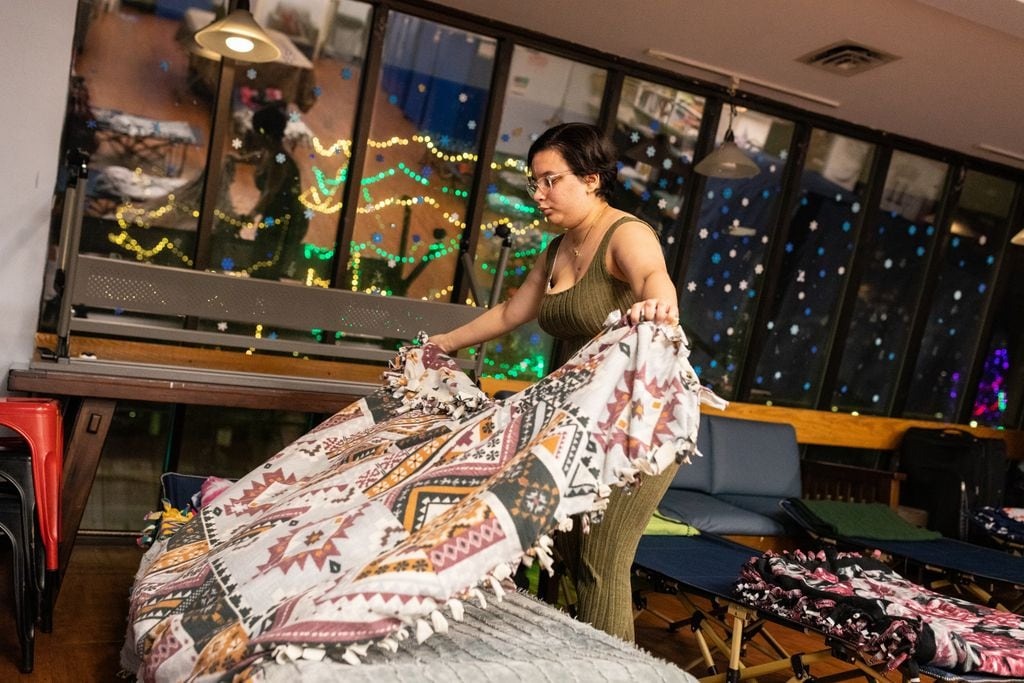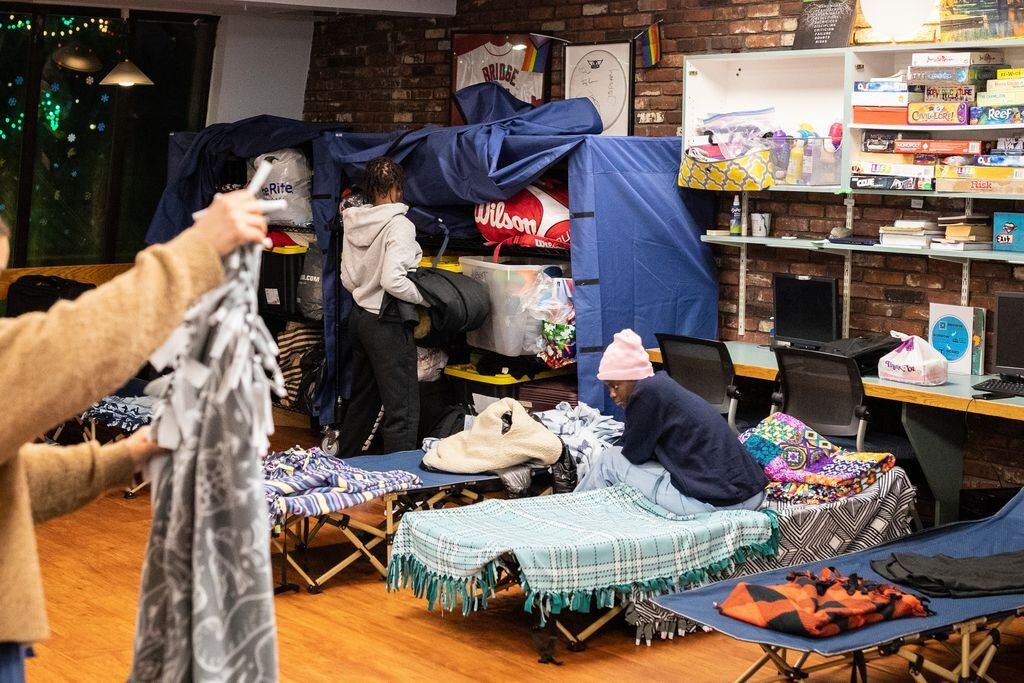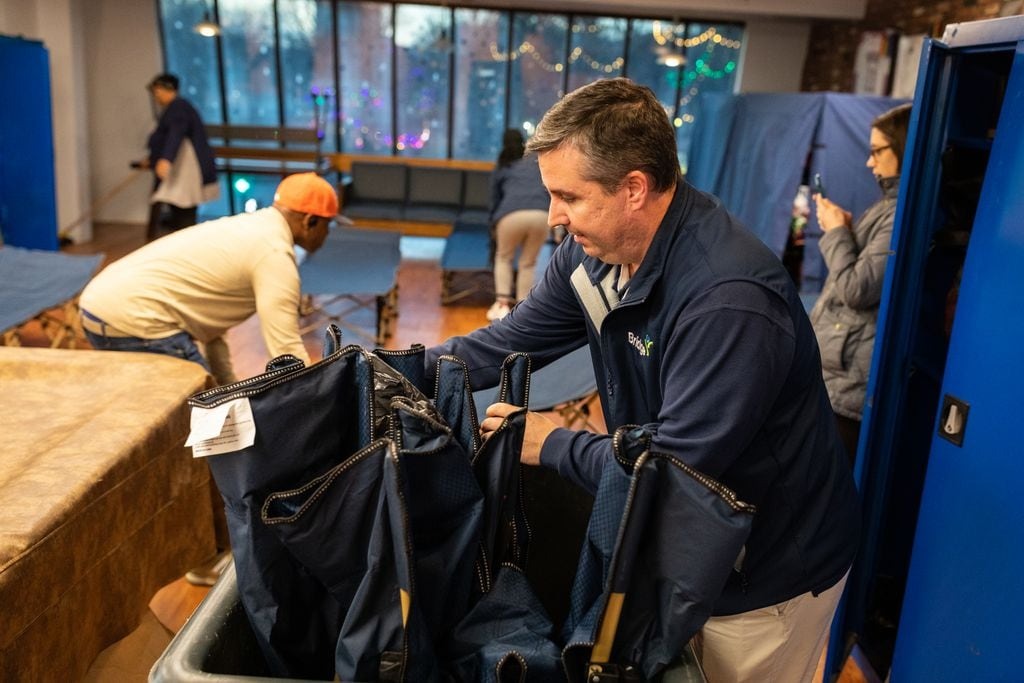The Boston Globe: “Boston’s homeless shelters for young adults are pressed to their limits by surging demand this winter”
By
https://www.bostonglobe.com/2024/02/17/metro/homeless-boston-shelter-young-migrant/



One afternoon last week, staff at the Bridge Over Troubled Waters Welcome Center covered the pool table and pushed aside the community room’s furniture to make space for a dozen collapsible cots.
Not long after the makeshift beds were assembled, young people with backpacks began arriving to stake out where they would sleep that night.
It’s a daily routine at the shelter, which this winter has often seen more people in need of beds than it could accommodate. Demand for space at the center, which also offers medical care, education, and temporary shelter to unhoused people ranging in age from teenagers to those in their mid-20s, has increased by 42 percent compared with this time a year ago.
“We don’t have enough spaces anywhere,” said Elisabeth Jackson, Bridge’s president and chief executive, who calls Bridge’s youngest tenants her babies. “We are seeing young people coming in and trying to get services and trying to understand how to stay away from the cold.”
Throughout the city, people who provide care and shelter for young adults in homelessness say demand has swelled this year, driven in part by the surge of migrants coming to the city and mirroring an increase in homelessness citywide that has left officials scrambling for options. While Boston is still tabulating the results of its late January citywide count of people experiencing homelessness, city officials noted the demand for emergency shelter among young adults was higher in January than at any time in the past year.
Those who are young and homeless in the city are at greater risk of falling victim to sexual predation and trafficking, which is why there are shelters that cater exclusively to them.
“Youth can easily be victimized in the adult shelters,” said Aura Obando, medical director of the family team at the Boston Health Care for the Homeless program. “They’re just not seen as safe.”
Young people also need services that go beyond a warm place to sleep, such as programs offering mental health care and educational opportunities to which they may be more receptive than older adults. Jackson noted she has seen people go from occupying a cot at Bridge to attending college and graduate school.
Yet there are just three facilities in the Boston area focused on care and support for homeless young people. City officials were not able to immediately confirm the number of emergency shelter beds dedicated to young adults, but providers estimated there are between 50 and 60 in Boston.
“Our waitlist is at an all-time high right now,” said Joshua Grant, senior director of transition-age youth at Home for Little Wanderers, which focuses on children and young adults experiencing homelessness in Massachusetts, New Hampshire, and New York and offers 16 shelter beds at Liberty Village in Roxbury. “If we had 32 beds we could fill them without a question.”
Statewide, 23 programs focus on emergency housing and support for the estimated 2,000 to 3,000 young adults who live in homelessness, according to advocates who work with the population.
Even before the current surge, only 23 percent of youth experiencing homelessness said they had received the housing support they needed, according to a statewide survey taken two years ago.
In Boston, the Mayor’s Office of Housing reported a significant increase in young people moved to permanent housing in January compared to the prior 12 months.
But that hasn’t relieved shelters, Jackson said. Bridge, where about a third of the people who come in annually need shelter for close to two years, is loath to turn people away. The welcome center, which typically has capacity for 20 people, often takes on more in a night. Last week, as Boston braced for a winter storm that never materialized, the welcome center added an additional eight cots in a classroom, and prepared to shift people to other Bridge facilities.
The young adult homeless population includes migrants who undertook journeys from as far as West Africa to reach Boston and locals who work or go to school but cannot afford a place to live in the competitive and expensive housing market.
Djènetou and Madina Dieng, sisters from Guinea, are among those relying on Bridge for shelter this winter. The sisters left Guinea and traveled through half a dozen countries on their trek from West Africa to the United States, including a walk from Nicaragua to Arizona, before arriving in Boston in December.
“It’s really cold,” said Djènetou, 19, through an interpreter. “I’ve never felt anything like it.”
She left Guinea with Madina, 18, and a 16-year-old sister now in the care of the Department of Children and Families to escape a bad family situation and seek asylum, she said. They speak French and understand only limited English.
About 65 percent of those who come to Bridge say family conflict contributed to their homelessness, said Peter Ducharme, the shelter’s clinical director.
About half of all young adults experiencing homelessness statewide experienced foster or residential placement as children. Others have tumultuous family lives, among them members of the LGBTQ population.
“They tell stories of coming out to their parents and getting kicked out, or getting pregnant and getting kicked out, or getting in trouble with the law and getting kicked out,” said Obando, of Boston Health Care for the Homeless.
They, as well as young migrants traumatized by conditions in their home country or the hardships of travels to the United States, need mental health care, Obando said. Others have never had access to medical care.
The Dieng sisters described initially staying at an area mosque. They left, Djènetou said, after experiencing aggression there.
Their experience has been different at Bridge, where earlier this month the sisters were among those who gathered for a communal dinner in the shelter’s kitchen.
“It reassures me to be here,” she said.